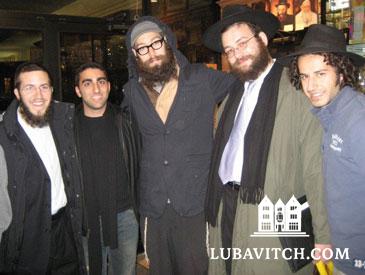After a long day of research and lab work, Jewish students in elite universities are pumping up the volume on Matisyahu’s reggae hits and digging into the Chasidic mysteries behind the lyrics in new Chabad on-campus courses.
Chabad centers at Carnegie Mellon, Dartmouth, UCLA and Ohio State are among those who have plumbed the blisteringly swift lyrics to fish out the Talmudic and Chassidic references. “It’s not a dry, text-based kind of class,” said Rabbi Shmuel Weinstein of Chabad House on Campus – Pittsburgh. “It will spawn a lot of conversation and discussion.
Dartmouth’s Matisyahu course was a change from Chabad’s more overtly intellectual offerings – a lecture on intelligent design and creation drew a nice crowd – but the music course was no lightweight. “The students know he is rapping about Jewish concepts,” said Rabbi Moshe Leib Gray, “but to really understand them you need all these prerequisites.
As a for instance, Rabbi Dovid Gurevich of Chabad House at UCLA sliced and diced the song “Chop ‘Em Down” from Matisyahu’s Shake Off the Dust… Arise album. From the forest itself comes the handle for the ax, the opening lyric, is actually a quote from the Talmud. Rabbi Gurevich taught: “Tanya chapter 31 uses this quote to explain how solutions can often be found within the problem itself, or the need to start solutions (or growth) from the turf of the problem (or where we are now).” Once Matisyahu mentions a concept, it sanctions mention in class and brings even more obscure topics to the table, like the Chasidic take on bittul — self-nulification.
Biology graduate student Michael Weinstein who can be found working in a genetics lab at UCLA attended the classes. “I have been a fan of his music for a while, and I was interested in hearing the stories behind the lyrics. It was nice to gain some insights into the meaning.” One of the benefits of hosting the class, the rabbis said, was attracting students who do not participate in other Chabad events. Digging deep into lyrics is not a distinctly Jewish obsession as those who remember spending hours probing “I am the Walrus” for clues to Paul’s well being can attest.
Back in the day, Matisyahu’s appearances at Chabad campus parties were commonplace. Purim parties, Sukkot blowouts and Saturday night events drew larger and larger crowds as Matisyahu’s fame grew. Rabbi Weinstein said his Chabad House which serves Carnegie Mellon and several Pittsburgh universities was one of the first to bring the rising star out for a concert.
Playing to sold out crowds in Washington D.C., Philadelphia and New York, Matisyahu’s price points are beyond most Chabad centers’ budgets. But he played when at Chabad on Campus held its massive New York Shabbat retreat, several UCLA students attending the Matisyahu course were in the audience. “It was an interesting interaction,” said Rabbi Gurevich.
In a larger sense, for Matisyahu, known to his mother as Matthew Miller, the courses on his songs are signs of a journey come full circle. After a semester in a high school in Israel, Matisyahu became more committed to his Jewish heritage through Chabad on Washington Square in NYC, and Hadar Torah, a Lubavitch yeshiva in Brooklyn. Now his lyrics are being used to help others discover what lies beneath the surface of their Jewish identity.

Be the first to write a comment.